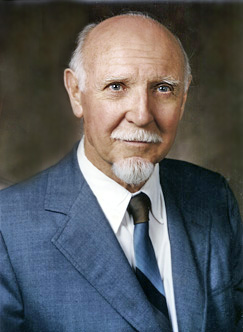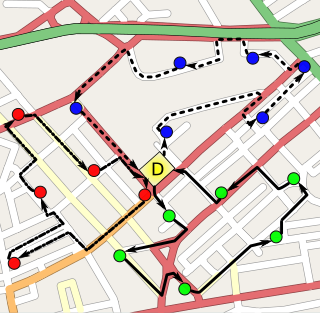Multivariate statistics is a subdivision of statistics encompassing the simultaneous observation and analysis of more than one outcome variable, i.e., multivariate random variables. Multivariate statistics concerns understanding the different aims and background of each of the different forms of multivariate analysis, and how they relate to each other. The practical application of multivariate statistics to a particular problem may involve several types of univariate and multivariate analyses in order to understand the relationships between variables and their relevance to the problem being studied.

Psychological statistics is application of formulas, theorems, numbers and laws to psychology. Statistical methods for psychology include development and application statistical theory and methods for modeling psychological data. These methods include psychometrics, factor analysis, experimental designs, and Bayesian statistics. The article also discusses journals in the same field.

Psychometrics is a field of study within psychology concerned with the theory and technique of measurement. Psychometrics generally refers to specialized fields within psychology and education devoted to testing, measurement, assessment, and related activities. Psychometrics is concerned with the objective measurement of latent constructs that cannot be directly observed. Examples of latent constructs include intelligence, introversion, mental disorders, and educational achievement. The levels of individuals on nonobservable latent variables are inferred through mathematical modeling based on what is observed from individuals' responses to items on tests and scales.

Statistics is the discipline that concerns the collection, organization, analysis, interpretation, and presentation of data. In applying statistics to a scientific, industrial, or social problem, it is conventional to begin with a statistical population or a statistical model to be studied. Populations can be diverse groups of people or objects such as "all people living in a country" or "every atom composing a crystal". Statistics deals with every aspect of data, including the planning of data collection in terms of the design of surveys and experiments.
Chemometrics is the science of extracting information from chemical systems by data-driven means. Chemometrics is inherently interdisciplinary, using methods frequently employed in core data-analytic disciplines such as multivariate statistics, applied mathematics, and computer science, in order to address problems in chemistry, biochemistry, medicine, biology and chemical engineering. In this way, it mirrors other interdisciplinary fields, such as psychometrics and econometrics.

Theoretical computer science (TCS) is a subset of general computer science and mathematics that focuses on mathematical aspects of computer science such as the theory of computation, lambda calculus, and type theory.

Raymond Bernard Cattell was a British-American psychologist, known for his psychometric research into intrapersonal psychological structure. His work also explored the basic dimensions of personality and temperament, the range of cognitive abilities, the dynamic dimensions of motivation and emotion, the clinical dimensions of abnormal personality, patterns of group syntality and social behavior, applications of personality research to psychotherapy and learning theory, predictors of creativity and achievement, and many multivariate research methods including the refinement of factor analytic methods for exploring and measuring these domains. Cattell authored, co-authored, or edited almost 60 scholarly books, more than 500 research articles, and over 30 standardized psychometric tests, questionnaires, and rating scales. According to a widely cited ranking, Cattell was the 16th most eminent, 7th most cited in the scientific journal literature, and among the most productive psychologists of the 20th century. He was a controversial figure due in part to his friendships with, and intellectual respect for, white supremacists and neo-Nazis.

Calyampudi Radhakrishna Rao,, commonly known as C. R. Rao, is an Indian-American mathematician and statistician. He is currently professor emeritus at Pennsylvania State University and Research Professor at the University at Buffalo. Rao has been honoured by numerous colloquia, honorary degrees, and festschrifts and was awarded the US National Medal of Science in 2002. The American Statistical Association has described him as "a living legend whose work has influenced not just statistics, but has had far reaching implications for fields as varied as economics, genetics, anthropology, geology, national planning, demography, biometry, and medicine." The Times of India listed Rao as one of the top 10 Indian scientists of all time. In 2023, Rao was awarded the International Prize in Statistics, an award often touted as the "statistics’ equivalent of the Nobel Prize". Rao is also a Senior Policy and Statistics advisor for the Indian Heart Association non-profit focused on raising South Asian cardiovascular disease awareness.
Stephen Elliott Fienberg was a Professor Emeritus in the Department of Statistics, the Machine Learning Department, Heinz College, and Cylab at Carnegie Mellon University. Fienberg was the founding co-editor of the Annual Review of Statistics and Its Application and of the Journal of Privacy and Confidentiality.

Quantitative psychology is a field of scientific study that focuses on the mathematical modeling, research design and methodology, and statistical analysis of psychological processes. It includes tests and other devices for measuring cognitive abilities. Quantitative psychologists develop and analyze a wide variety of research methods, including those of psychometrics, a field concerned with the theory and technique of psychological measurement.

Andrew Ehrenberg was a statistician and marketing scientist. For over half a century, he made contributions to data reduction/analysis and presentation, and to understanding buyer behaviour and how advertising works.
Economics education or economic education is a field within economics that focuses on two main themes:
Environment statistics is the application of statistical methods to environmental science. It covers procedures for dealing with questions concerning the natural environment in its undisturbed state, the interaction of humanity with the environment, and urban environments. The field of environmental statistics has seen rapid growth in the past few decades as a response to increasing concern over the environment in the public, organizational, and governmental sectors.

Applied mathematics is the application of mathematical methods by different fields such as physics, engineering, medicine, biology, finance, business, computer science, and industry. Thus, applied mathematics is a combination of mathematical science and specialized knowledge. The term "applied mathematics" also describes the professional specialty in which mathematicians work on practical problems by formulating and studying mathematical models.

Data science is an interdisciplinary academic field that uses statistics, scientific computing, scientific methods, processes, algorithms and systems to extract or extrapolate knowledge and insights from noisy, structured, and unstructured data.
Geoffrey John McLachlan FAA is an Australian researcher in computational statistics, machine learning and pattern recognition. McLachlan is best known for his work in classification and finite mixture models. He is the joint author of five influential books on the topics of mixtures and classification, as well as their applications. Currently, McLachlan is a Professor of statistics within the School of Mathematics and Physics at the University of Queensland.
Jean-François Richard is a Belgian-American economist, who is currently the distinguished university professor of Economics at the University of Pittsburgh. He has taught and done research at five major universities, primarily in the field of econometrics. His interests are auctions, computational methods, collusions, Bayesian methods and econometric modeling. He has been extensively involved as author, editor, and advisor with scholarly publications in econometrics and related fields.
Computational Psychometrics is an interdisciplinary field fusing theory-based psychometrics, learning and cognitive sciences, and data-driven AI-based computational models as applied to large-scale/high-dimensional learning, assessment, biometric, or psychological data. Computational psychometrics is frequently concerned with providing actionable and meaningful feedback to individuals based on measurement and analysis of individual differences as they pertain to specific areas of enquiry.







